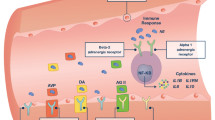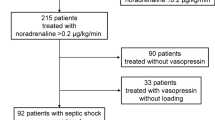Abstract
Objective
To assess the efficacy of arginine vasopressin (AVP) as a rescue therapy in children with catecholamine refractory vasodilatory shock and its effect on various hemodynamic, clinical, and laboratory variables.
Methods
This prospective hospital based study was conducted from January 2008 through July 2008 at a tertiary pediatric cardiac critical care unit. Twelve post cardiac surgery patients with advanced vasodilatory shock requiring intravenous vasopressin infusion longer than 60 min were included and continuous vasopressin infusion was given. The primary outcome measures were restoration of Mean arterial blood pressure (MAP) after starting AVP infusion and decrease in other concurrent catecholamines requirement. The secondary outcome measures were survival to hospital discharge, adverse effects, and laboratory variables.
Results
Vasopressin was infused in the dose range of 0.0005 to 0.003units/kg/min for a mean duration of 55.6 h. MAP improved from 41.08 ± 6.15 mmHg at baseline to 48.92 ± 10.05 mmHg after 1 h (P < 0.05), to 57.01 ± 8.30 mmHg after 4 h of AVP infusion (P < 0.001), and to 62.33 ± 8.55 mmHg after 12 h (P < 0.001), which further increased to 71.75 ± 9.55 mmHg after 24 h (P < 0.001). Inotrope score and requirement of other concurrent inotropes declined significantly in all patients after starting AVP infusion (P < 0.001). Lactate levels also declined significantly (P < 0.0001). No significant adverse effect due to end organ ischemia was observed. Only one patient expired while on vasopressin infusion due to refractory hypotension.
Conclusions
Concurrent addition of vasopressin at an appropriate stage help improving MAP significantly with decreased dependence on high dose catecholamines without any significant adverse effects.
Similar content being viewed by others
References
Landry DW, Oliver JA. The pathogenesis of vasodilatory shock. N Engl J Med. 2001;345:588–95.
Prielipp RC, Butterworth J. Cardiovascular failure and pharmacologic support of the peripheral vasculature after cardiac surgery. New Horiz. 1999;7:472–88.
The American Heart Association in Collaboration with the International Liaison Committee on Resuscitation (ILCOR). Part 6: Advanced cardiovascular life support. Section 6: Pharmacology II: agents to optimize cardiac output and blood pressure. Resuscitation. 2000;46:55–62.
Farand P, Hamel M, Lauzier F, Plante GE, Lesur O. Organ perfusion/permeability-related effects of norepinephrine and vasopressin in sepsis. Can J Anesth. 2006;53:934–46.
Landry DW, Levin HR, Gallant EM, et al. Vasopressin deficiency contributes to the vasodilation of septic shock. Circulation. 1997;95:1122–5.
Landry DW. Vasopressin deficiency and hypersensitivity in vasodilatory shock: discovery of a new clinical syndrome. P&S Med Rev. 1996;3:3–4.
Landry DW, Levin HR, Gallant EM, et al. Vasopressin pressor hypersensitivity in vasodilatory septic shock. Crit Care Med. 1997;25:1279–82.
Argenziano M, Chen JM, Choudhri AF, et al. Management of vasodilatory shock after cardiac surgery: identification of predisposing factors and use of a novel pressor agent. J Thorac Cardiovasc Surg. 1998;116:973–80.
Luckner G, Dünser MW, Jochberger S, et al. Arginine vasopressin in 316 patients with advanced vasodilatory shock. Crit Care Med. 2005;33:2659–66.
Dunser MW, Mayr AJ, Ulmer H, et al. Arginine vasopressin in advanced vasodilatory shock: a prospective, randomized, controlled study. Circulation. 2003;107:2313–9.
Efrati O, Modan-Moses D, Vaedi A, Matok I, Bazilay Z, Paret G. Intravenous arginine vasopressin in critically ill children: is it beneficial? Shock. 2004;22:213–7.
Masutani S, Senzaki H, Ishido H, et al. Vasopressin in the treatment of vasodilatory shock in children. Pediatr Int. 2005;47:132–6.
Rosenzweig EB, Starc TJ, Chen JM, et al. Intravenous arginine vasopressin infusions in children with vasodilatory shock after cardiac surgery. Circulation. 1999;100:II182–6.
Holmes CL, Walley KR, Chittock DR, Lehman T, Russell JA. The effects of vasopressin on hemodynamics and renal function in severe septic shock: a case series. Intensive Care Med. 2001;27:1416–21.
Meyer S, Gottschling S, Baghai A, Wurm D, Gortner L. Arginine- vasopressin in catecholamine-refractory septic versus non-septic shock in extremely low birth weight infants with acute renal injury. Criti Care. 2006;10:R71.
Rodríguez-Núñnez A, López-Herce J, Gíl-Antón J, Hernández A, Rey C, RETSPED Working Group of the Spanish Society of Pediatric Intensive Care. Rescue treatment with terlipressin in children with refractory septic shock: a clinical study. Crit Care. 2006;10:R20.
Goldstein B, Giroir B, Randolph A. International pediatric sepsis consensus conference: definition for sepsis and organ dysfunction in pediatrics. Pediatr Crit Care Med. 2005;6:2–8.
Wernovsky G, Wypij D, Jonas RA, et al. Postoperative course and hemodynamic profile after the arterial switch operation in neonates and infants: a comparison of low-flow cardiopulmonary bypass and circulatory arrest. Circulation. 1995;92:2226–35.
Kulik TJ, Moler FW, Palmisano JM, et al. Outcome-associated factors in pediatric patients treated with extracorporeal membrane oxygenator after cardiac surgery. Circulation. 1996;94:II63–8.
Carrel T, Englberger L, Mohacsi P, Neidhart P, Schmidli J. Low systemic vascular resistance after cardiopulmonary bypass: incidence, etiology, and clinical importance. J Card Surg. 2000;15:347–53.
Wakatsuki T, Nakaya Y, Inoue I. Vasopressin modulates potassium channel activities of cultured smooth muscle cells from porcine coronary artery. Am J Physiol. 1992;263:H491–6.
Lechner E, Hofer A, Mair R, et al. Arginine vasopressin in neonates with vasodilatory shock after cardio pulmonary bypass. Eur J Pediatr. 2007;166:1221–7.
Meyer S, Gortner L, McGuire W, Baghai A, Gottschling S. Vasopressin in catecholamine-refractory shock in children. Anaesthesia. 2008;63:228–34.
Yildizdas D, Yapicioglu H, Celik U, Sertdemir Y, Alhan E. Terlipressin as a rescue therapy for catecholamine resistant shock in children. Intensive Care Med. 2008;34:511–7.
Russell JA, Walley KR, Gordon AC, et al. Vasopressin versus norepinephrine infusion in patients with septic shock. N Engl J Med. 2008;358:877–87.
Choong K, Bohn D, Fraser DD, et al. Vasopressin in pediatric vasodilatory shock: a multicenter randomized controlled trial. Am J Respir Crit Care Med. 2009;180:632–9.
Jerath N, Frndova H, McCrindle BW, Gurofsky R, Humpl T. Clinical Impact of Vasopressin infusion on heamodynamics, liver and renal functions in pediatric patients. Intensive Care Med. 2008;34:1247–80.
Dünser MW, Mayr AJ, Ulmer H, et al. The effects of vasopressin on systemic hemodynamics in catecholamine-resistant septic and postcardiotomy shock: a retrospective analysis. Anesth Analg. 2001;93:7–11.
Dünser MW, Fries DR, Schobers-berger W, et al. Does arginine vasopressin influence the coagulation system in advanced vasodilatory shock with multiorgan dysfunction syndrome? Anesth Analg. 2004;99:201–6.
Conflict of Interest
None.
Role of Funding Source
None.
Author information
Authors and Affiliations
Corresponding author
Rights and permissions
About this article
Cite this article
Agrawal, A., Singh, V.K., Varma, A. et al. Intravenous Arginine Vasopressin Infusion in Refractory Vasodilatory Shock: A Clinical Study. Indian J Pediatr 79, 488–493 (2012). https://doi.org/10.1007/s12098-011-0557-z
Received:
Accepted:
Published:
Issue Date:
DOI: https://doi.org/10.1007/s12098-011-0557-z




